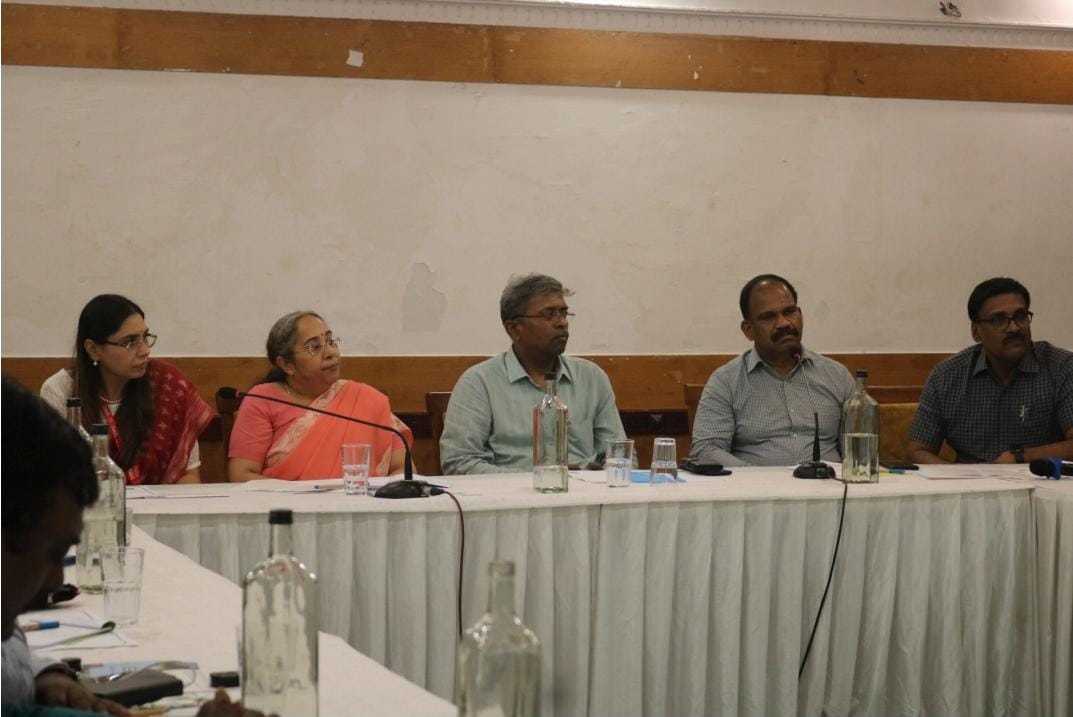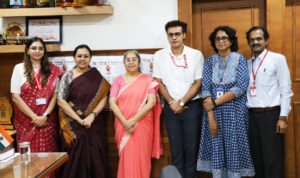Published Jul 28, 2025 | 8:00 AM ⚊ Updated Jul 28, 2025 | 8:00 AM

From the co-development workshop, chaired by Health Secretary Dr. Rajan N Khobragade last week
Synopsis: Amid rising cases of student suicides, substance abuse, and screen addiction, Kerala will pilot a national research project to build a ‘behavioural vaccine’ for youth. Jointly launched by the ICMR and Kerala government, the three-year study aims to develop an evidence-based model for suicide prevention and emotional well-being in schools and colleges under the “ICMR Multi-State Implementation Research” programme
At a time when Kerala is grappling with a disturbing spike in student suicides, substance abuse, screen addiction, and campus violence, the state is set to become the testing ground for a national-level implementation research project aimed at creating a ‘behavioural vaccine’ for young minds.
Launched jointly by the Indian Council of Medical Research (ICMR) and the Government of Kerala, the ambitious three-year study titled “ICMR Multi-State Implementation Research on Suicide Risk Reduction and Improving Mental Wellbeing among School and College Students” seeks to develop an evidence-based model to prevent suicide and promote emotional well-being in educational institutions.
It’s learnt that Kerala was selected for this prestigious project in recognition of its proactive approach to public health and the pressing need to address student mental health.
The principal investigator of the study is Dr. Indu P S, Principal of Government Medical College, Kasaragod and a leading expert in community medicine.
In an exclusive interaction with South First, Dr. Indu explained that the project is not a conventional intervention or trial.
“This is implementation research — we are working with the system, not around it. It’s about identifying what works in real-world conditions and scaling that up,” she said. Dr. Indu noted that suicide prevention among youth has been identified as a top research priority nationally.
Kerala, according to her which presented a detailed project proposal, is now positioned to help create a scalable model to address the crisis. The study will run in Thiruvananthapuram and Kollam districts, which report the highest number of student suicides in the state.
A diverse mix of institutions — government and private, urban and rural, including arts and science colleges, engineering, medical, law, dental, nursing, and polytechnics — have been selected through stratified sampling.
Student hostels and educational institutions in tribal regions are also included to ensure comprehensive representation. Training for staff from selected schools began on 16 July, with sessions coordinated by the Kollam District Collector.
“The project has two main objectives,” said Dr. Indu.
“The first is to improve the overall wellbeing of students — addressing issues like violence, screen dependence, substance use, and emotional regulation. The second is focused suicide risk reduction — identifying and supporting students who are at higher risk,” she added. The approach is both preventive and participatory.
Special training will be given to teachers and even peer groups to help them identify early signs of distress, mood changes, or depression among students. “This is a shift from our usual model of waiting for symptoms or crises. We aim to build systems that identify risk factors early and intervene meaningfully,” she said.
The project is being carried out with the involvement of multiple departments — Health, Education, Higher Education, Women and Child Development, Police and others.
A recent co-development workshop, chaired by Additional Chief Secretary Dr. Rajan N Khobragade, brought together these stakeholders alongside the ICMR team led by Dr. Ashoo Grover, head, Division of Implementation Reserach, ICMR, New Delhi.
ICMR specialists including Dr. Neha Dahiya and Dr. Pulkit Verma, and other experts from various fields also participated in the planning sessions.
One of the project’s most promising ideas is the identification of student leaders, who will be trained and transformed into Youth Champions. These champions will serve as peer role models, helping to destigmatize mental health conversations and spread awareness across campuses.
“We want to build a culture where seeking help is normal and caring for mental health is seen as a strength,” Dr. Indu said.
Kerala is part of a larger national consortium that includes leading institutions such as NIMHANS-Bengaluru, AIIMS-Jodhpur and Guwahati, Tata Institute of Social Sciences-Mumbai, the Institute of Human Behaviour and Allied Sciences-New Delhi, and Rajiv Gandhi University-Arunachal Pradesh.
However, Kerala’s focus on suicide prevention gives it a unique role within this network. As the project progresses, the ultimate goal is to develop a replicable and scalable model that can be adopted by schools and colleges across India.
“Kerala is not just participating in a study,” said Dr. Indu. “We’re co-creating a blueprint for a healthier, emotionally resilient generation.”
Officials point out that in a state that has been struggling with the mental health of its youth, this initiative could well be the “behavioural vaccine” it desperately needs.
The study also grew significant especially with the Supreme Court ruling on 25 July that the right to mental health is an integral part of the fundamental right to life and dignity (Article 21). The bench comprising Justices Vikram Nath and Sandeep Mehta held that mental well-being is inseparable from the right to life. The apex court also issued a set of guidelines for ensuring psychological well-being of students.
At the same time, Dr. T V Anil Kumar, Head of Psychiatry, Government Medical College, Ernakulam, told South First that the research aims to not just diagnose mental health concerns but to dismantle the barriers that prevent youth from seeking help — the biggest being stigma.
“Depression was once seen as an adult concern, but today, adolescents and youth are increasingly vulnerable. One of the leading causes of suicide is depression. Identifying it early and encouraging those affected to seek help is crucial,” says Dr. Anil Kumar. “But it’s not just about identifying — it’s about creating a social environment that makes seeking help normal,” he added.
Anil Kumar was part of the team that hold discussions with the experts from the ICMR when they called on Health Minister Veena George last week.

ICMR team and state health officials with Health Minister Veena George
The cornerstone of this project is the creation of a support system within educational institutions.
Existing platforms such as the NSS, NCC, and Student Police Cadets will be roped in to create “Youth Champions” — students trained to act as mental health ambassadors and peer supporters.
Teachers, too, will play a pivotal role. Recognized as the first line of observation, they will undergo “Gatekeeper Training” — a component of the study that focuses on sensitizing teachers to spot early signs of depression and refer students for appropriate care.
“Converting every teacher into a counsellor is a long-term goal of the state. This study aligns with that vision,” says Dr. Anil Kumar.
Parental involvement and inter-departmental coordination The research emphasizes that no single entity can fight this crisis alone. Parents, school managements, PTAs, and multiple government departments will all need to coordinate to build a preventive mental health framework.
The study identifies a critical gap in this regard — the absence of coordinated action when a child shows signs of distress. “This is about opening a channel where authorities and families act together, where no child falls through the cracks because someone was afraid to speak up,” Dr. Anil Kumar points out.
Another key finding guiding the study is the recognition that counselling alone may not be sufficient. In certain cases, psychiatric intervention is necessary, and awareness about this must be built within the community.
Seeking psychiatric help must be destigmatized. To understand the broader mental health landscape among school children, the study will assess stress levels, depression indices, and health-seeking behaviors.
Researchers will also track school dropouts, a group often left out of such studies despite being at high risk.
A core analytical framework of the study will be the identification of the “Four Ps” — Predisposing, Precipitating, Perpetuating, and Protective factors that influence mental health.
Based on these findings, the team hopes to recommend interventions that are not just reactive but preventive.
“This isn’t just about identifying problems. We’re looking at solutions. A holistic, behavioral change that protects our youth before they spiral into crisis. We’re trying to develop a behavioural vaccine,” says Dr. Anil Kumar.
The study is ambitious, and its implementation will require a multi-sectoral approach involving health, education, social welfare, and local governance.
“In theory, this all sounds ideal. But in practice, coordinating between departments, training teachers, convincing families — these are big challenges,” he admits. But if successful, the model could become a replicable blueprint not just for Kerala but for other states grappling with rising mental health issues among youth.
“This is not just a research study. It is a social intervention — one that can redefine how we approach mental health in our schools and colleges,” Dr. Anil Kumar concludes.
By embedding mental health care within the education system and building a collaborative, stigma-free support network, the state is setting the stage for a transformative, evidence-based model — a “behavioural vaccine” — that could be scaled across India. If implemented effectively, this research will not only save lives but also foster a culture where seeking help is seen as strength, not stigma.
(Edited by Ananya Rao)

